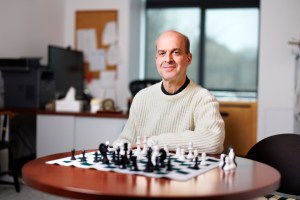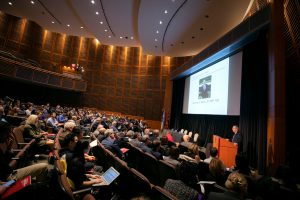Tag: Harvard Medical School
-
Health
Broccoli and Brussels sprouts: Cancer foes
Broccoli, Brussels sprouts and other cruciferous vegetables have long been thought to be good for you, new research finds a mechanism for its cancer-fighting abilities and points the way to a new anti-cancer drug.
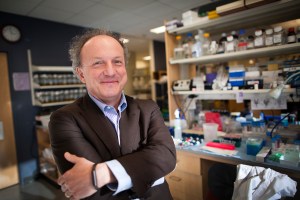
-
Health
Mini-gut reaction
Researchers at Massachusetts General Hospital have created miniature, simplified versions of the intestine in vitro to explore how the gut lining and microbiome respond to gluten in both healthy and celiac patients.

-
Science & Tech
Easy on the eyes
New computer program uses artificial intelligence to determine what visual neurons like to see. The approach could shed light on learning disabilities, autism spectrum disorders, and other neurologic conditions.

-
Science & Tech
AI model predicts TB resistance
A Harvard undergrad, working with Harvard Medical School scientists, has designed an artificial intelligence model that predicts tuberculosis resistance to 10 most commonly used drugs. The new model outperforms previous machine-learning tools, and incorporating it into clinical tests could dramatically enhance early detection and prompt treatment of drug-resistant TB.
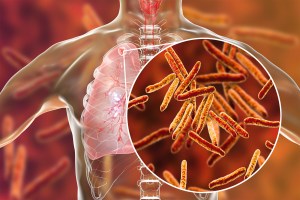
-
Campus & Community
$9 million donation earmarked for cannabis research
Alumnus gives $9 million in largest donation to date to support independent research on the science of cannabinoids at Harvard and MIT. “Our desire is to fill the research void that currently exists in the science of cannabis,” said donor Charles R. “Bob” Broderick.

-
Health
Weighing in on workplace wellness programs
In the first major multisite randomized controlled trial of workplace wellness programs, researchers found that while they may help people change certain behaviors, they do little to improve overall health or lower health care spending.

-
Health
Detecting DNA defects
A new algorithm designed by HMS scientists can be incorporated into standard genetic tests to successfully identify patients harboring a tumor-fueling DNA repair defect found in multiple cancers treatable with existing drugs.
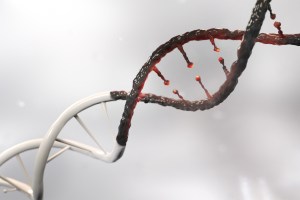
-
Health
Inoculating against misinformation
A new survey by Harvard researchers shows that trust in leaders and institutions are at a low ebb in the eastern Democratic Republic of the Congo, highlighting the importance of gaining trust as part of the response to the growing Ebola epidemic there.

-
Health
DNA testing could save young lives through early intervention
During her Radcliffe fellowship, pediatric oncologist Lisa Diller is studying the implications of genetic testing in newborns, and planning research that focuses on testing babies for gene changes associated with cancers known to strike the very young.
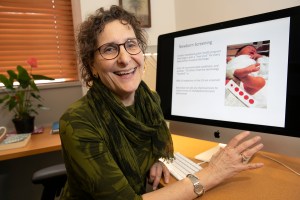
-
Health
Cells recall the way they were
Study in mice reveals that adult tissues retain a memory of which genes are activated during very early development, and that that memory can be recovered. Under certain conditions, adult cells play their developmental “movie” in a slow rewind, reactivating fetal genes. These findings have important implications for regenerative medicine and cancer research.
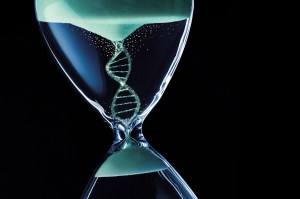
-
Health
Sleep, heart disease link leads from brain to marrow
New research from Massachusetts General Hospital traces a previously unknown pathway from poor sleep to an increase in the fatty plaques that line blood vessels in atherosclerosis, a key feature of cardiovascular disease.
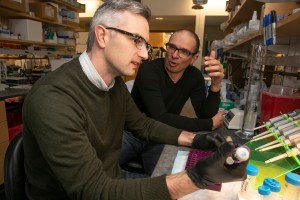
-
Health
Untangling the connection
Harvard Medical School researchers have found that impaired insulin signaling in the brain negatively affects cognition, mood, and metabolism, all components of Alzheimer’s disease.
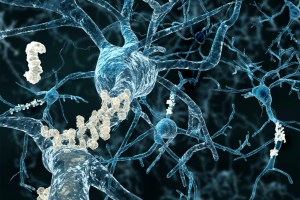
-
Campus & Community
The right job, the right place
When the clock struck noon this third Friday of March, 167 Harvard Medical School students learned where they will spend the next three to seven years of their training, and the specialty in which they’ll work.

-
Health
First-time opioid prescriptions drop by 50 percent
Based on a Harvard study, the monthly rate of first-time opioid prescriptions dropped by more than half between 2012 and 2017. A new concern now is whether some patients are getting less-than-adequate treatment for their pain.
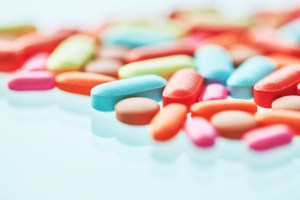
-
Health
The algorithm will see you now
AI is coming to a hospital near you — but it may be in the world’s remote regions that it could impact patients most. However, experts gathered at Harvard said its potential will not be realized unless it is deployed as part of broader health care solutions, not simply as a tool in search of…

-
Science & Tech
DNA reveals we are all genetic mutts
Geneticist David Reich discusses DNA findings that show how migration shaped Europe and southern Asia, and that “No population is, or ever could be, pure.”
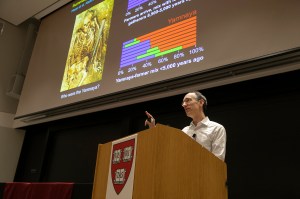
-
Health
Overlapping surgeries mostly safe
Overlapping surgeries, in which more than one doctor performs sequential surgeries in different operating rooms, have raised concerns about potential adverse outcomes — but a new analysis shows they carry no greater risk for low-risk, noncardiac patients.
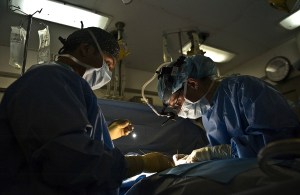
-
Campus & Community
A rise through the ranks
At Harvard Medical School, Calixto Sáenz worked his way up to become director of the microfluidics core facility.
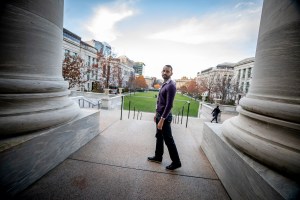
-
Health
Exercise, fasting help cells shed defective proteins
A new study from the Blavatnik Institute finds that intense exercise and fasting activate hormones that boost cells’ capacity to dispose of defective proteins, which clog up the cell, interfere with its functions, and, over time, precipitate diseases including neurodegenerative conditions such as ALS and Alzheimer’s.

-
Health
The science, business of aging
A half-day conference at Harvard Business School examined the growing promise of research on aging and the potential of now-experimental interventions to one day ease the burdens of infirmity.
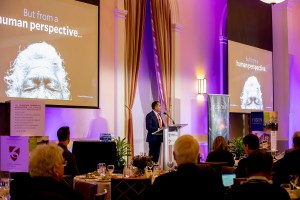
-
Health
Soldiers’ songs of pain — but also healing
A project to write songs using individual soldiers’ combat experiences appears to help them overcome haunting memories of war, lessening the impact of trauma held too close for too long.

-
Health
The master of survival
Proteins produced by the tardigrade are suspected of playing a role in the organism’s resilience, ultimately providing the basis for human therapies that halt tissue damage and prevent cell death.
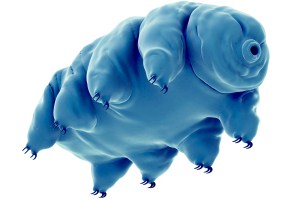
-
Science & Tech
Science at the speed of ‘light-sheet’
Combining two recently developed technologies — expansion microscopy and lattice light-sheet microscopy — researchers have developed a method that yields high-resolution visualizations of large volumes of brain tissue, at speeds roughly 1,000 times faster than other methods.

-
Health
ZIP code or genetic code?
In the largest study of U.S. twins to date, researchers use insurance records to tease out the effects of genes and the environment in 560 diseases.

-
Health
Transforming transgender care
With a $1.5 million gift, Harvard Medical School launched the Sexual and Gender Minorities Health Equity Initiative, a three-year plan to amend the core M.D. curriculum so that all students and faculty clinicians can become exceptionally well equipped to provide high-quality, holistic health care for sexual and gender minority patients of all ages.

-
Health
Nerve-signaling pathway that drives sustained pain found
Harvard researchers have identified in mice a set of neurons responsible for sustained pain and pain-coping behaviors. The new study is the first one to map out how these responses arise outside the brain.
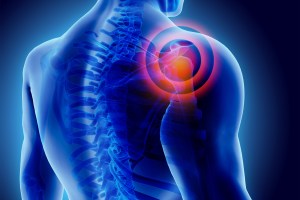
-
Health
A nation nearer to the grave
Against a backdrop of recent jumps in drug overdose deaths and suicide, McLean Hospital psychologist R. Kathryn McHugh discusses the opioid crisis and increasing suicide deaths with the Gazette.
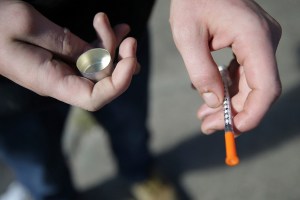
-
Nation & World
Lies we can’t live without
NYU philosopher Kwame Anthony Appiah will draw from his new book, “The Lies That Bind: Rethinking Identity,” when he visits Harvard Medical School to deliver the 2018 George W. Gay Lecture.

-
Health
The difference a year makes
A Harvard study has found that children born in August in states with a Sept. 1 cutoff birth date for school enrollment have a 30 percent higher risk for ADHD diagnosis than peers born in September, which may reflect overdiagnosis.



